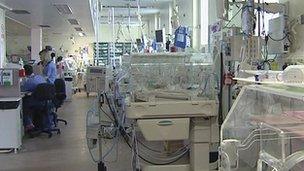Royal Maternity baby unit: New Pseudomonas case suspected
- Published

The neo-natal unit at the Royal is undergoing a deep clean
The Department of Health has confirmed it is treating what appears to be another case of Pseudomonas at the Royal Maternity's neo-natal unit.
Over the past fortnight, three babies have died after contracting the bacterial infection.
Laboratory tests have yet to confirm the new case, but it is understood the child is very ill with the symptoms of the infection.
An investigation is continuing to try to find the source of the outbreak.
A deep clean was carried out at the weekend and the health minister said the water system is under scrutiny.
In order to kill off the infection, hydrogen peroxide gas was blown inside the sealed intensive care room via a large vaporizing machine.
This permeates everything, including cupboards, drawers, surfaces, bins and any equipment.
Specialists spent the day investigating a range of possible sources.
Taps have been removed, while sinks and the interior of pipes have been checked.
Health Minister Edwin Poots said his department was fully across the investigation.
"We have identified a number of potential problems," Mr Poots said.
"We will be getting a report back tomorrow, all being well, in terms of the potential for it to come from a water source problem.
"That has been the case in other outbreaks of Pseudomonas elsewhere and that's currently being investigated.
"We can't suggest at this stage that's what the cause of the problem is, but it's certainly one of the areas being investigated."
Traces on skin
Five babies have traces of the bacterial infection on their skin.
While it is not affecting their health, they are being closely monitored to make sure it does not enter their blood stream.
Chief Medical Officer Michael McBride said antibiotics might be given as a precaution.
He also warned it might not be possible to identify the source of the infection, as the efforts to eradicate it, may have erased traces of how it started.
"We will look widely we will seek to identify and potential source and indeed deal with that source, but it may not be possible to do so.
"We know from experience elsewhere that we can bring this infection under control through good infection control practices."
The first baby died on 6 January and the second on 13 January. A third baby died on Thursday night.
Pseudomonas aeruginosa is found widely in soil and stagnant water. It does not usually cause illness in healthy people but can pose a serious threat to people with weak immune systems.
- Published23 January 2012
- Published22 January 2012
- Published22 January 2012
- Published9 October 2012
- Published21 January 2012